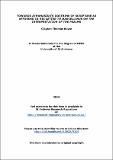Files in this item
Towards Athanasius's doctrine of Scripture as afforded in his 'Letter to Marcellinus on the interpretation of the Psalms'
Item metadata
| dc.contributor.advisor | Elliott, Mark | |
| dc.contributor.author | Rowe, Clayton Thomas | |
| dc.coverage.spatial | vi, 96 p. | en_US |
| dc.date.accessioned | 2016-08-17T09:24:01Z | |
| dc.date.available | 2016-08-17T09:24:01Z | |
| dc.date.issued | 2016-06 | |
| dc.identifier.uri | https://hdl.handle.net/10023/9319 | |
| dc.description.abstract | Athanasius is best known for his role as defender of the Council of Nicaea, and for his contribution to trinitarian doctrine. Due to his importance in the history of Christian thought, much attention has been given to his polemical use of Scripture, which was aimed at various theological opponents. In the midst of these polemics, he strings together seemingly unrelated biblical texts in order to make his theological points. His exegesis has therefore often been criticized for lacking any coherent framework. Such criticism is usually levelled against him in light of modern exegetical concerns and practices. In the first chapter I argue that fair evaluation of Athanasius’s use of Scripture can only begin after his doctrine of Scripture is formulated. Questions regarding exegetical framework and consistency of interpretation can only be answered after one understands Athanasius’s theological conception of Scripture. This study offers a step in that direction by examing Athanasius’s Letter to Marcellinus on the Interpretation of the Psalms. In the second chapter, I piece together Athanasius’s understanding of inspiration. I then explore how pneumatology, trinitarianism, and Athanasius’s understanding of God’s presence to creation relate to Athanasius’s doctrine of Scripture. In the third chapter, I explore his statements regarding the words of Scripture in Marcellinus, in order to demonstrate how the words of Scripture relate creedal language. The fourth chapter begins to demonstrate the implications Athanasius’s doctrine of Scripture have for Athanasian studies. I argue that Athanasius and Origen have more in common than a comparison of their use of Scripture might indicate. The final chapter of the body of the work argues that Athanasius’s doctrine of Scripture factors into his list of canonical books. The conclusion of this work further draws out the implications of this study. This work demonstrates that Athanasius’s doctrine of Scripture elucidates his use of Scripture, and offers further implications for Athanasian studies inculcated by Athanasius’s doctrine of Scripture. | en_US |
| dc.language.iso | en | en_US |
| dc.publisher | University of St Andrews | |
| dc.subject.lcc | BR65.A446R7 | |
| dc.subject.lcsh | Athanasius, Saint, Patriarch of Alexandria, ca. 298-373 | en_US |
| dc.subject.lcsh | Athanasius, Saint, Patriarch of Alexandria, ca. 298-373. Ad Marcellinum | en_US |
| dc.subject.lcsh | Authority--Religious aspects--History of doctrines | en_US |
| dc.subject.lcsh | Bible--Evidences, authority, etc.--History of doctrines | en_US |
| dc.subject.lcsh | Bible. Psalms--Criticism, interpretation, etc | en_US |
| dc.title | Towards Athanasius's doctrine of Scripture as afforded in his 'Letter to Marcellinus on the interpretation of the Psalms' | en_US |
| dc.type | Thesis | en_US |
| dc.type.qualificationlevel | Masters | en_US |
| dc.type.qualificationname | MPhil Master of Philosophy | en_US |
| dc.publisher.institution | The University of St Andrews | en_US |
This item appears in the following Collection(s)
Items in the St Andrews Research Repository are protected by copyright, with all rights reserved, unless otherwise indicated.

